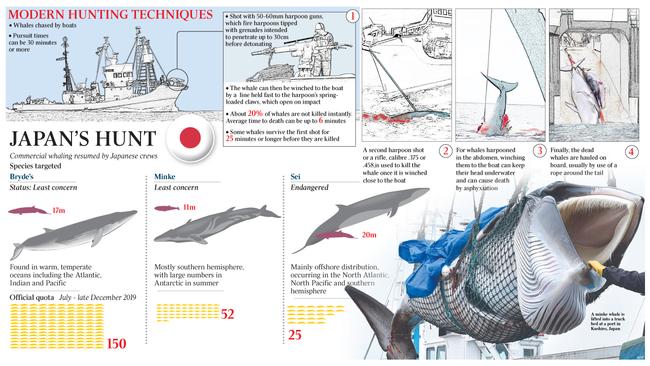Whaling feeds Japan’s pride
Tokyo’s decision to resume commercial hunting sends a message to critics around the world, despite no appetite for whale meat at home.

It is one of the ironies surrounding the hunting of whales that such a bitter and ill-tempered international dispute should rage around the world’s most serene and dignified mammals.
Beneath the surface, the whales glide with beauty and grace; above it, those who hunt them, as well as many of those who fight to save their lives, lie, manipulate, smear and bully one another with ruthless abandon.
Whale politics is an ugly business, fuelled by nationalism, prejudice and wilful ignorance. The international gatherings at which it is debated have been the scenes of walkouts, allegations of bribery and dirty tricks, and ill-disguised bitterness between the pro and anti-whaling factions.
New venom in debate
This month the already toxic debate received a new dose of venom as Japan walked out of the International Whaling Commission and resumed commercial whaling for the first time in 31 years.
The environmental campaign group Humane Society International called it “a new and infamous era of pirate whaling”. A Japanese government spokesman promised to “hand over … our country’s rich whaling culture to the next generation”.
But what does this step, on the face of it a defeat for the environmental movement, really mean for whales and for the whaling industry? And why, in a world stricken by environmental problems and international disagreements, does this one generate such heat and fury?
There is a quality of bitterness and rancour in the whaling debate that sets it apart from other international disputes; both sides evince a self-righteousness that they would never display on other, arguably more important, matters.
Few have matched the sneakiness and bad faith of the Japanese government itself.
Scientific whaling
It was in 1986 that members of the IWC, concerned that excessive hunting was threatening some species with extinction, voted to impose a moratorium on commercial whaling. Norway and Iceland opposed it from the beginning and continued to hunt whales “under objection”.
Japan, which has a long and honourable postwar record of multilateralism in other spheres, chose to abide by the ban but did everything it could to overturn it and to slither through loopholes.
The latter it achieved under the guise of “scientific” whaling. According to IWC rules, member nations are allowed to kill whales for the purposes of research.
In theory, this is a worthy and valuable provision: to assess the animals’ numbers and welfare, based on the contents of their stomachs, the number of young carried by pregnant females, and their distribution.
In practice, it was the pretext for industrial whaling, carried out by factory ships under the sponsorship of the Japanese government, which at its peak brought back 1000 dead whales a year. Tellingly, it generated virtually no scientific papers. In 2014, the International Court of Justice agreed with a complaint by Australia that the actions violated Japan’s international obligations. The hunting was temporarily halted, only to be resumed after being “redesigned” to make it more convincing as a scientific program.
Just as outrageous and bizarre were the efforts of the Japanese government to nobble the deliberations of the IWC. The pro-whaling lobby was led by Japan and supported by Norway and Iceland, all with long histories of whale hunting. But it also contained countries without any such traditions, including the African nations of Benin, Cameroon, Gabon and Senegal, as well as the landlocked Asian nation of Mongolia. These developing countries usually had one thing in common: the extent to which they benefited from rich Japanese aid programs.
In the most embarrassing revelations, whistleblowers from Dominica, Grenada and Solomon Islands recounted how tens of thousands of dollars were paid by Japan in the form of aid for fisheries projects and IWC membership costs. One former whaling commissioner described how mysterious strangers would materialise at airports to hand over cash to the IWC. Observers at an IWC meeting in 2005 reported an amusing moment when the delegate from the West African nation of Mauritania was called on to cast a ballot, but did not know which way to lean because Japan had not yet voted.
“I don’t think the international legal community has yet come up with a term to describe this blatant purchasing of small country governments by Japan,” said the former environment minister of Dominica, Atherton Martin. “That has to go down in legal history as being the high-end of public-sector extortion.”

Arrogance and insecurity
Why did Japan go to such lengths, across so many years, in pursuit of a practice condemned by so many of its closest friends and allies — countries such as the US, Australia and Britain — with which it finds common ground on so many matters of international concern? Even putting aside the rights and wrongs of whaling, the arguments about the cruelty of the hunt and the extent to which the animals were endangered, it has served only to harm Japan’s international image during a period when it was recovering so successfully from the nadir of the mid-20th century.
Japan’s insistence on whaling, and the dirty tricks used in pursuit of that end, played into the most negative and racist stereotypes of the years during and after World War II — images of the Japanese as sneaky, voracious, indifferent and cruel.
“I can’t understand it,” former British fisheries minister Ben Bradshaw says. “We are a great friend and ally of Japan in almost every other field. And it is completely inexplicable to me that Japan, Norway and Iceland continue to push for a resumption of commercial whaling.”
The explanation for all this is a complicated fusion of nationalism, bureaucratic arrogance and a deep-seated insecurity about Japan’s natural resources. Whaling, for some, represents the outer rampart of an island nation’s long-term strategy to defend its food security.
Give in to the environmentalists on whaling, the reasoning goes, and next they will come for tuna, and other overfished species which are much more important to the Japanese diet; all of this when growing demand from the insatiable Chinese market is putting Asian fishing stocks under unprecedented pressure.
It also has much to do with nationalism — not a raucous, flag-waving, chauvinistic nationalism but the quiet, cosy, domesticated kind that flourishes in Japan and that has developed powerful roots in the Fisheries Agency.
Some attribute it to an incident in London in 1979, long forgotten elsewhere but painfully remembered in Tokyo, when environmentalists splashed Japanese fisheries officials with red paint, calling them “murderers”. For whatever reasons, the agency has bred a succession of tenacious officials with a flair for controversy and colourful phrases, rare in Japanese public officials — men who gave the impression of enjoying the fight and taking pleasure in outraging their opponents. The greatest of them was probably Masayuki Komatsu, who famously described minke whales as a “cockroach in the ocean”. “Because there are too many,” he explained, “and (because of the) speed of the whale, you know, swimming so quick.”
The sentimental ideal of the whale hunter — intrepid, isolated, stoically courageous, alone against the sea and against international opinion — flatters a certain image that some Japanese have of themselves and their national character. On a more mundane level, several senior members of the conservative government of Shinzo Abe, including the Prime Minister himself, have whaling towns in their constituencies. But there is also a sense among many ordinary, reasonable and unfanatical Japanese that on this matter they are genuinely being treated unfairly.
It is one thing not to support whaling, and to avoid eating whale meat oneself, but it something else again to insist that no one in the world should have the right to do it either. Whales are difficult to count, but it is clear that the numbers of some species, such as the minke, have risen to the extent that they are no longer endangered. Whales do suffer when they are harpooned but so do all animals and birds that are hunted in the wild. It is arguable that the quality of life of a slaughtered whale is no worse overall than the pathetic existence of a factory-farmed chicken.
The whale, in the West, has come to be regarded by many people as a sacred animal, in a different category from a cow, pig or deer. But many Japanese would question the logic of this, and the assertion that whales are uniquely intelligent, noble and valuable compared with other creatures killed and exploited by humans.
Uneaten meat
Domestic opinion undoubtedly has been hardened by international efforts to influence Japanese policy. Internationally, the campaign against whaling, pitched as a struggle of good against evil by organisations such as the Sea Shepherd Conservation Society, has won widespread support; in Japan the xenophobia stirred up by anti-whaling activists has strengthened the determination of the nationalist right, and irritated many ordinary people without strong feelings one way or another.
Within the country, whaling has never been an issue of lively concern to voters, most of whom have never eaten whale or shown much concern about their welfare one way or another. But opinion surveys suggest that, when asked, plenty of Japanese object to being told, especially by foreigners, what they can and cannot eat, a point made with characteristic force by the Fisheries Agency.
“It should be called an act of ‘cultural imperialism’,” it said in a statement a few years ago, “and should not be tolerated that certain ethnic groups or peoples press their sense of values towards animals of their selection on other groups or peoples.”
But one fact cannot be overcome: consistently, and across decades, modern Japanese have demonstrated that they have almost no interest in eating whale meat. In 1962, 200,000 tonnes was sold nationally; in 2016, the figure was 3000 tonnes, compared with 2.6 million tonnes for pork and 2.4 million tonnes of chicken. On average, Japanese people eat 50g of whale each year, the equivalent of a bar of chocolate. Most people never touch it.
Commercial illusion
The notion of “commercial whaling”, in other words, is an illusion. In leaving the IWC, Japan has abandoned the mendacious “scientific hunts” that took between 330 and 1000 whales a year. If the trade were put on a genuinely commercial basis, it would support the hunting of far fewer than that — the low hundreds at the most, not enough to present any danger to global stocks. And if current trends continue, the demand for it will have died out almost completely within a generation or two.
It is revealing that, beyond cautiously worded statements, environmental groups in Japan, including the national branch of Greenpeace, have given up active campaigning. They know that it is unnecessary; they understand that in the long term whaling is dead, and that the worst thing they could do now would be to poke it back into life. All that is now needed is to cut the lectures, call off the demonstrations, quell the megaphone diplomacy, and let the whales live.
The Times

To join the conversation, please log in. Don't have an account? Register
Join the conversation, you are commenting as Logout